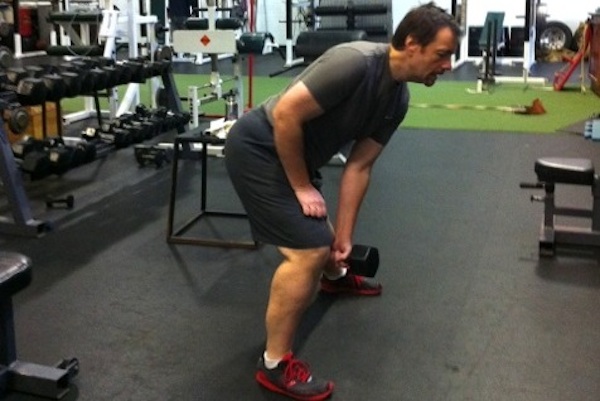It’s one thing for people to lose weight while they’re following a prescribed nutrition and exercise program. The real test is what happens when the program’s over.
Pretty much any program can provide results of some kind, assuming you actually do the program. But what happens once the program ends?
- Can you maintain your weight loss?
- Can you sustain the health and fitness improvements you made?
For a lot of people, that’s where the difficulty comes in. Once they’re “off the program,” the weight comes back with a vengeance. And all the great health and fitness benefits start to disappear.
But is this inevitable? Heck no!
In this article, we’ll share 8 important weight loss maintenance secrets – straight from our Lean Eating Coaching clients – that’ll make “falling off the wagon” a thing of the past.
Lesson 1: Adopt new goals and never say never
At age 30, Linda McFeeters was an expert on the three Ps: pop tarts, pasta, and pop. She ate a lot of those. In fact, she weighed 310 pounds before finally getting serious about her health.
Through a combination of working with a personal trainer and participating in our Lean Eating Coaching program, Linda lost about 150 pounds.
Since then, she’s maintained a body fat of about 16%. She’s continued to be an active and valuable member of the Precision Nutrition community. And she’s even set some new goals, competing in powerlifting and open water distance swimming.
“When I was 30, I was totally sedentary, and weighed over 300 pounds. If you would have told me that, at 50, I’d be entering all sorts of different physical competitions, I would have told you to go back smoking whatever it was that made you hallucinate!” she says with a laugh.
For Linda, setting personal goals has been the key. And, as you can see, her goals aren’t about body weight.
“To compete in power lifting, to reach certain numbers on the bar and not on the scale… that’s something I never thought I would say!”
She also adds that her “never say never” attitude has been very important.
“There is no ‘I can’t’ in my vocabulary. I haven’t used that phrase in years. I may decide not to, I may choose not to, but I never say I can’t.”
Lesson 2: Choose activities you love
Marilyn Anderson graduated from Lean Eating in November, 2009. She lost only 6 pounds of scale weight, but that translated into 4.6% body fat and 10 inches. Continuing on in what was then the alumni program, Marilyn lost an additional 10 inches and 5 more pounds.
“I am now 58 years old, in the best shape of my life, weigh the same as I did when I was 21, and have lost a total of 25 inches.”
Not only that, she can fit into the wedding gown she first wore 34 years ago. Pretty impressive.
Since then, Marilyn realized that her motivation stays high when she does exercise that she enjoys. For her, that’s hiking and running, especially in Hawaii, where she spends a month each year.
“One of our favorite secluded beaches is only accessible by hiking,” she says, “and one of our more challenging hikes was a 9 hour trek across lava fields to see an active volcano.”
During her weight loss phase in Lean Eating, Marilyn didn’t do a lot of hiking or distance running. Instead, she did a mix of exercises designed to help her shed body fat, including: resistance exercise, interval exercise, and a small amount of aerobic exercise. And it worked.
Now, she focuses mostly on what she loves.
Like Linda McFeeters, Marilyn also sets new goals to maintain motivation. Goals that have little to do with body weight.
“My favorite was a virtual run around the Big Island of Hawaii. I ran 232 miles, averaging 17.2 miles per week. I posted photos on my member log of the places we have actually visited as I reached those virtual landmarks.”

Lesson 3: Stick with the basics and chose the minimum effective dose
Sometimes, life gets chaotic. And, at times like that, it’s best to go back to the basics.
In the past year, Lean Eating graduate Jennifer Bryan lost her father, her mother, and then her beloved golden retriever.
“I am an emotional eater, and there have been stressful times in my life where I gained as much as 25 pounds in a short time,” she says.
“By going back to just a few basic Lean Eating habits, I was able to maintain my weight despite everything that’s been going on in my life,” she adds.
Jennifer began Lean Eating in August 2010, and continued on with a second group to graduate 22 pounds lighter in December, 2011.
The two Lean Eating practices she returns most to are: stopping eating when she’s just satisfied (and not stuffed), and eating more vegetables (and fewer sugars/starches). And these make all the difference for her.
In the end, when life gets most hectic, instead of trying to do everything all at once, simplify. Stick with the most important basics. Because that’s enough to maintain your results.
Lesson 4: Notice and name your mental (and social) roadblocks
Life is full of difficult losses and external pressures, as Jennifer’s example shows. But sometimes it’s our internal environment that needs work.
Scott Parry graduated from Lean Eating in December, 2011. He started the program at around 205 pounds and 26% body fat, and finished at a lean 154 pounds and less than 10% body fat. Since then, he keeps is weight below 170 pounds and 12% body fat.
As a Lean Eater, Scott learned the importance of “calling my own BS.”
You see, Scott’s friends gave him a lot of grief over his new lifestyle choices. As a result, he noticed himself starting to justify one extra beer here, one missed workout there. On some level, he worried that his friends would ditch him. That he’d end up healthy and lean but all alone.
However, he quickly recognized this pattern. And instead of giving in, he held his ground.
Over time, Scott’s friends quit joking and started asking for help. This was a big psychological win. He learned that, instead of being alone, he’s more engaged with his social group, helping them reach their goals too.
“Through the coaching I received in Lean Eating, I learned how to “notice and name” my behaviours (positive or negative) and consciously choose how I’ll respond to situations.”

Lesson 5: Audit your behaviors regularly and give attention to your weak links
Rebecca Wilson agrees. Like Scott, she graduated from Lean Eating in December, 2011.
Since then, she’s made a commitment to intentionally revisit the Lean Eating practices.
“I’ve challenged myself to truly re-practice the LE habits. Of course, the habits aren’t hard. And I don’t mean to imply you have to be obsessive. But you do have to check in regularly to make sure your behavior is really what you want it to be.”
Like Jennifer, Rebecca finds that: stopping eating when she’s just satisfied (and not stuffed), and eating more vegetables (and fewer sugars/starches) are the two habits that slip most often for her.
And since she knows that these are her challenges, she’s more mindful of them.
“Each person needs to know his or her personal weak spots and stay on top of those a little more,” she adds.
Lesson 6: Spend time with positive people also interested in fitness and health
It’s always easier to stay on top of things if you have a great support network.
John Romkey will attest to that. He went through the Lean Eating program twice, beginning in August, 2010 and finishing up in December, 2011. During that period, he lost more than 100 pounds. More impressive, he’s kept it off.
Support from others is essential. “The social scene at my gym is incredible. If I started slipping, I’m sure a dozen people I barely know would express their concern for me and try to help,” he explains.
Supportive friends have also encouraged him to try new things, and that, in turn, has boosted his motivation.
“If you’ve lost a lot of weight you can probably do things after Lean Eating that you couldn’t before. I’m doing things like tennis, which I haven’t tried in 30 years, and I’m better at them now than I was as a teenager,” he says.
“As much as you can, surround yourself with supportive people. Make new friends if you need to. The positive influence from other people is incredible.”

Lesson 7: Use life lessons to maintain your weight loss; use weight loss lessons to maintain your life
Kirsten Yelvington lost 41 pounds in her first six months of Lean Eating. She went on to lose another 12 pounds, taking her body fat from 35% to 13% overall.
And she did it all while facing some extraordinary personal challenge. She moved across her state to be closer to her family, rejoined the work force, and watched her mother succumb to ovarian cancer.
With every challenge, the lessons Kirsten learned in Lean Eating seemed more and more relevant.
“The program is called “Lean Eating,” but I believe that getting lean is just a side effect of the program,” she says. “The lessons coached me through everyday challenges without using food as a crutch.”
In the past, Kirsten might have wasted time “wondering and worrying” – something we talk about in Lean Eating – when her house didn’t sell or she had to prepare for an important interview. But because of Lean Eating, “I focused on the here and now and what I’m able to do today.”
“Since graduating from the program I also ask the question, ‘How’s that working for you?’ That one question reminds me that every decision I make is my choice and I do have the power to change a habit if it is not supporting my goals.”
Even during her difficult months of grief, what she learned in the program kept her anchored to her core values.
Lesson 8: Stay involved and connected to a success community
If there’s one quality that unites all successful maintainers, it’s that they work at staying connected.
In other words – either through the Precision Nutrition forums, Precision Nutrition facebook pages, or through relationships they’ve built with other Lean Eaters in their community – they stay in touch with folks who can help.
Nancy Harris started her maintenance phase a bit frightened. She’d lost 23 pounds and 7.8% body fat in the Lean Eating program, despite the fact that the cartilage in both her knees was shot. But when the program ended, she wondered if she’d be able to keep up with all she’d learned.
Luckily, “It was easier than I thought. I kept active in the forums and that really helped. We also created a Coed Lean Eating group on Facebook, which has given me the opportunity to meet other like-minded individuals,” she says.
With all that support, Nancy can even contemplate her upcoming knee surgery with relative calm. She knows that if she trusts the Lean Eating habits and remains honest with herself, she’ll pull through.
Learning to maintain
In the end, weight loss isn’t the same as weight maintenance. In fact, weight maintenance requires a different skill set entirely.
The eight secrets shared in this article will help you build that skill set. And if you’re looking for more help, consider our Lean Eating Coaching Program.
Want to know more about Lean Eating?
Twice per year we accept new clients into the Lean Eating Coaching Program, where we coach small groups of men and women using the Precision Nutrition System and help them achieve the best fat loss results of their lives.
The results, to date, have been nothing short of remarkable. Over a hundred and fifty thousand pounds of fat lost, and over 8,000 lives changed in the process.
To see some examples of the amazing changes taking place in this program, just visit any one of the links below:
- January 2012 Male Finalists
- January 2012 Female Finalists
- July 2011 Male Finalists
- July 2011 Female Finalists
- January 2011 Male Finalists
- January 2011 Female Finalists
- August 2010 Male Finalists
- August 2010 Female Finalists
- January 2010 Male Finalists
- January 2010 Female Finalists
Want help becoming the healthiest, fittest, strongest version of you?
Most people know that regular movement, eating well, sleep, and stress management are important for looking and feeling better. Yet they need help making it work in their busy, sometimes stressful lives.
That's exactly what PN Coaching does.
Over the past the past two decades, we’ve used the Precision Nutrition Coaching method to help over 150,000 clients lose fat, get stronger, and improve their physical and mental health… for the long-term… no matter what challenges they’re dealing with.
Our habit-based approach is backed by peer-reviewed research, trusted by professional athletes and elite sports teams, and has been taught to more than 175,000 health and fitness professionals worldwide through our Level 1 and Level 2 Certification programs.




Share